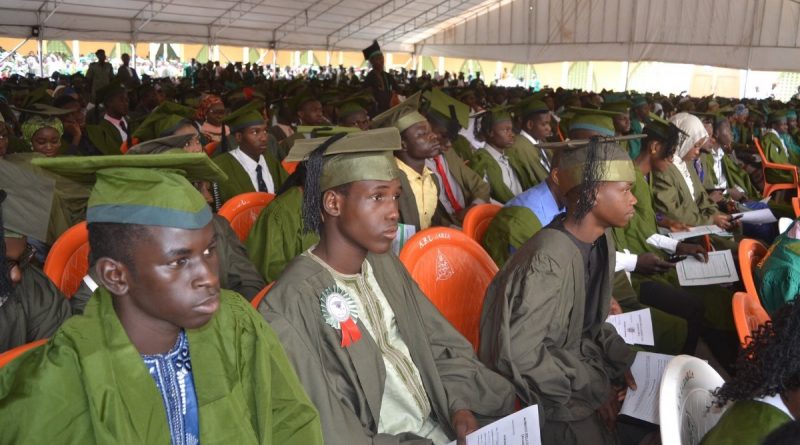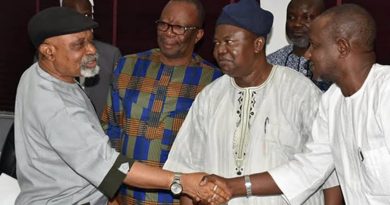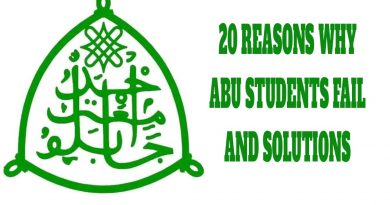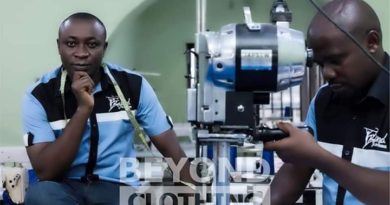Bumpy road for Nigerian undergraduates
Nigerian undergraduates must be an unlucky lot and, yet, the most determined. Hardly does an academic year pass without one kind of disruption or the other, a disruption that could last months or indeed cost an academic session for various reasons.
The academic staff must be at war with either local university authorities, or as a group against their employers, federal and/or state governments.
Hardly would such a war end than non-academic staff commence a separate battle for either some recognition or equal treatment with their academic staff colleagues. In the absence of any of these showdowns, undergraduates themselves might have been provoked into (violent?) protests against any perceived dissatisfaction by university authorities.
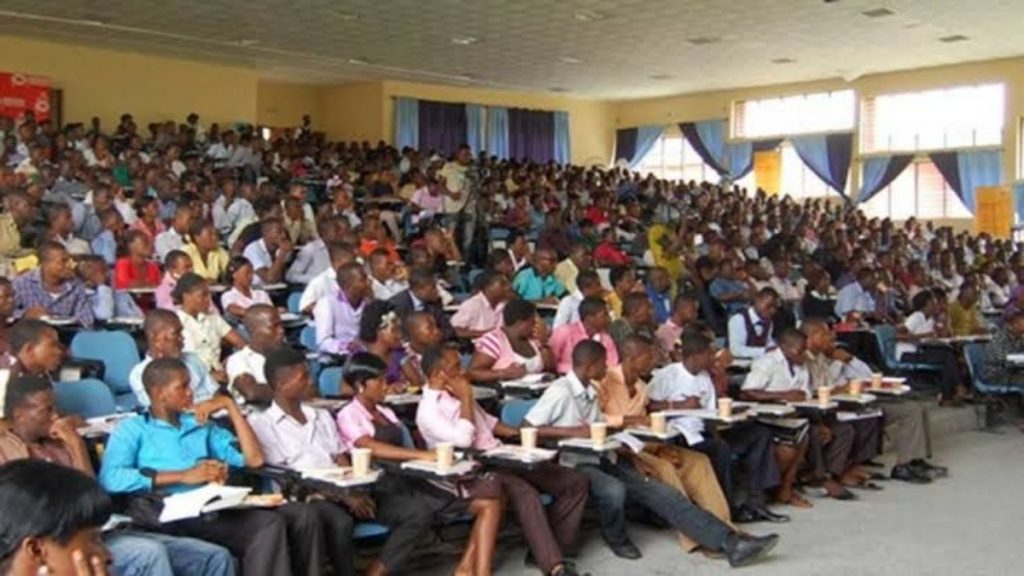
Very often, such initial protests could assume life-threatening dimensions to compel closure and dismissal of students indefinitely, as a safety measure. Such student unrest could be in particular institution(s) or in solidarity with colleagues on other campuses. The standard and regular point in dispute is the condition(s) of service of university staff.
Our universities were on such long disruption early this year, and were not necessarily any near agreement with the academic staff union to guarantee resumption of lectures when the ravaging worldwide coronavirus further ensured the continued closure of universities in Nigeria.
The remarkable aspect is that, despite this seeming incurable aspect of the headache in our university system, undergraduates (still) struggle to hold their own by emerging adequately skilled in most sectors, medicine, engineering, economics, science and even the arts, for postgraduate studies and employment in Europe, Britain, United States, Canada and Australia.
Disruption, even violent disruption of studies in Nigerian universities, dates back to colonial era, with the controversy over the succession of a Briton, Professor Kenneth Mellamby as vice-chancellor of University College, Ibadan, by a Nigerian, Professor Kenneth Dike, the first in that position.
The appointment of Dr. Okechukwu Ikejiani as chairman of University Council also caused such student violence to warrant closure of the institution for months. In 1961, the first fully autonomous University of Nigeria, Nsukka, with Dr. George Johnson (a black American from Michigan State University) as vice-chancellor, was barely a year old when students’ violent protests caused the university to be closed down for months.
The appointment of Professor Saburi Biobaku in 1965 as vice-chancellor, University of Lagos, to succeed Professor Eni Njoku, also caused such student violence and, indeed, Biobaku was nearly assassinated by an undergraduate. Inevitably, the university was shut for months. In 1973, under General Yakubu Gowon, the eviction of striking lecturers from their official quarters in universities throughout Nigeria led to long closure of the institutions.
Under General Olusegun Obasanjo, the nationwide violent student protests in 1978 shook Nigeria with the demand that federal commissioner of education “Ali Must Go.” Expectedly, in pursuit of that demand, all universities in Nigeria were engulfed in student violence and accordingly shut for months.
As military governor of old Mid-West State, Brigadier Samuel Ogbemudia (now late) faced students’ unrest from the University of Benin but he cleverly humoured his way through by riding in an open pick-up van round the streets of Benin, the state capital carrying his placard with the demand on the protesting students to “Give the Governor right of fair hearing.” It worked.
Protesters enjoyed the joke and went for discussions without violence. In 1986, under General Ibrahim Babangida, violent student protests at Ahmadu Bello University led to closure of the institution for about eight weeks to allow for inquiry. Again, under former President Olusegun Obasanjo as an elected civilian, student cultism caused violence and indefinite closure at Obafemi Awolowo University, Ile-Ife.
What is not clear is if the current closure of universities in Nigeria would have lasted this long without the lockdown compelled by coronavirus. But there is no doubt that the plague is a convenient cover for the government and ASUU to be unduly bellicose at negotiations. On the surface, it must be a miracle how Nigerian university system “smoothly” operates. But judging from the claim of the lecturers not long ago on the social media, it could never be so smooth.
Less than 10 per cent of Nigerian universities have video conference facility. Less than 20 per cent use interactive boards. More than 50 per cent don’t use public address system in their overcrowded lecture rooms/theatres. Internet services are non-existent or epileptic and slow in 99 per cent of Nigerian universities. Nigerian universities’ libraries are outdated and manually operated.
Bookshelves are homes to rats and cockroaches. No university library in Nigeria is fully automated. Less than 35 per cent are partially operated. There are 701 projects in Nigerian universities, out of which 163 (23.3%) are abandoned, 538 (76.7%) are PERPETUALLY on-going projects. Some of the abandoned projects in Nigerian universities are over 15 years old, while others are over 40 years old. Seventy-six per cent of Nigerian universities use well as source of water; 45 per cent use pit as latrine; 67 per cent of students use bush as toilet.
ALSO READ: ASUU STRIKE: Labour Politics and Voiceless Students’ Union in Nigeria
University of Nigeria, Nsukka, and UDUS have the highest number of abandoned projects (22 and 16, respectively). All NDDC projects across universities in Niger Delta states are abandoned. About 84.6 per cent of them are student hostels. Seventy-seven per cent of Nigerian universities can be classified as glorified primary schools. Laboratories are non-existent.
There are eight on-going projects at Nasarawa State University, Keffi. None of them is funded by the state government. Eighty per cent of Nigerian universities are grossly under-staffed. Seventy-eight per cent rely heavily on part-time or visiting lecturers. Eighty-eight per cent of Nigerian universities have under-qualified academics. Ninety per cent of Nigerian universities are bottom-heavy (with junior lecturers forming large chunk of the workforce).
Only 2 per cent of Nigerian universities attract expatriate lecturers, while over 80 per cent of Ghanaian universities attract same. Eighty-nine per cent of Nigerian universities have ‘closed’ homogeneous staff in terms of ethno-cultural background. Based on available data, there are 37,504 academics Nigerian public universities.
Eighty-three per cent of lecturers in Nigerian universities are male while 17 per cent are female; 29,030 (61.0%) of the lecturers are employees in federal universities, while 14,474 (39.0%) teach in state universities. The teaching staff/student ratio is embarrassingly very low in many universities.
Lecturer-student ratio National Open University, 1:363; University of Abuja, 1:122; Lagos State University, 1:111. Compare these to Havard, 1:4; MIT, 1:9; Yale, 1:4; and Cambridge, 1:3. In Nigerian universities, instead of having 100 per cent academics with Ph.Ds, only about 43 per cent do so. Nigerian medical students train in the most dangerous environment, as some see medical tools only in books. Only seven Nigerian universities have up to 60 per cent teaching staff with Ph.D qualification.
While majority of universities in Nigeria are grossly understaffed, a few cases present a pathetic figure. There are universities in Nigeria with only five Ph.D holders.. There are also purported universities of science and technology in different parts of the country with only two professors and five Ph.D holders or with 29 lecturers.
There is also the make-shift lecturing system. Out of 37,504 lecturers, only 28,128 (75 per cent) are engaged on full-time basis; 9,376 (25 per cent) Nigerian lecturers are recycled as visiting, adjunct, sabbatical and contract lecturers. In Gombe State University, only four out of 47 profs are full-time and all 25 Readers are visiting. In Plateau State University, Bokkos, 70 per cent of the professors are visiting.
In Kaduna State University, only 24 out of 174 Ph.D holders are full-time. Seven hundred ex-militants are receiving more funds annualy than 20 Nigerian universities, under Amnesty scam. Eighty per cent of published journals by Nigerian university lecturers have no visibility in the international knowledge community. No Nigerian academic is in the League of Nobel laureates or a nominee of the Nobel Prize.
Numerically, there are more support staff in the service of Nigerian universities than the teaching staff they are meant to support. More expenditure is incurred on administration and routine functions than in core academic matters in Nigerian universities. There are 77,511 non-teaching staff in Nigeria’s public universities, two times more than the number of academic staff.
Almost all Nigerian universities are over-staffed with non-teaching staff. Hostel facilities in Nigerian universities are overcrowded and overstretched, with poor sanitation, stinking lavatories and ill-functioning laundry services. Except Nigerian Defence Academy in Kaduna, no university in the country is able to accomodate more than 35 per cent of students in hostels.
Government is interested in spending money in founding new universities, instead of consolidating and expanding access to existing ones. Government is keen on awarding new contracts, rather than completing abandoned projects or standardising existing facilities. Government spends hundreds of millions of naira paying part-time or visiting lecturers, instead of hiring full-time staff.
Over 1,000 students in lecture halls meant for less than 150, or over 400 students struggling for places in a laboratory meant for only 75. Undergraduates sitting on bare floor or peeping through windows to attend lectures. Most state universities charge commercial rent for unfit and unsuitable hostel accomodation.
RECOMMENDED: The maltreatment of Nigerian students
That, so far, is the case for revamping university education in Nigeria. There should be no link between proper education and miseducation or, worse still, ill-baked education. In the current digital age, the only desirable and acceptable education is sound education as in civilised societies and meant for human beings.
There is, therefore, a valid point made by ASUU, to the effect that, instead of establishing anymore universities, possibly in the next decade, Federal Government should concentrate on modernising existing ones. And there are enough federal universities to be so modernised for the next 10 years.
On its part, whatever the merit in ASUU’s case should be limited by the reality of Nigeria’s financial muscle, a plea instantly weakened by the silly misplacement of priority in allocating N25 billion for the renovation of National Assembly Complex.
Which is more important, wasteful renovation of National Assembly Complex at such a whopping sum or consolidating our university system? Aside from that, despite so many unassailable points in ASUU’s case listed above, the seeming idea of aiming to redress the grievances of more than 10 years is not ideal.
The rot in the university system cannot be wiped away at once. The magnitude is so overwhelming that only the next few years can ease or, indeed, clear the problem. ASUU should consider the interest of the students, although, circumstantially, the problem lies with the looming menace of coronavirus.
The Sun News
For Advert Placement, Sponsorship, support, Article submission, suggestion, etc, Contact us: info@theabusites.com, +2349015751816 (WhatsApp)

